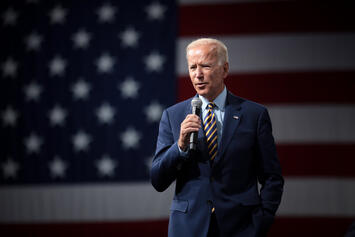
The recent passage of the CHIPS act, a $280 billion dollar subsidy, may prove a giant boondoggle. But it also reflects a critical shift in US economic policy away from neoliberal free trade policies to a more nationalistic industrial policy.
This trend may have started with President Trump, but his successor — along with leaders of both parties — have moved in this direction too. The earlier passage of The BuyAmerican.gov Act, the Make PPE in America Act, and the banning of the importation of Chinese products made with forced labour in Xinjiang, reflect this new dynamic.
These moves, along with Europe’s plans to boost its own chip production, represent a logical reaction to China’s stated ambitions to dominate the semiconductor market and other advanced technologies. More than any other country, China spends far more to support these industries, and it is time for America to respond in kind.
Although leftists and libertarians alike have criticised the CHIPS act, the bill is a potentially promising step forward in America’s drive to recapture leadership in the semiconductor industry. American semiconductor firms still account for nearly 50% of the global market share, even though barely 12% of the world’s semiconductors are manufactured here.
This could now be changing as new plants go up in places like Columbus, Ohio, where the first of two new Intel plants will employ 3,000 workers, and Arizona, where Taiwan Semiconductor Manufacturing Company is planning a $12 billion new plant. Meanwhile, South Korea’s Samsung has agreed to build a new $17 billion facility in Texas.
This proactive stance stems in part from the experience of the pandemic when the U.S. couldn’t manufacture medical equipment, notably masks and some drugs, since most production had shifted to China. Even the production of basic chemical products was difficult, while Covid-driven shortage of chips crippled production of automobiles and other goods.
Any drive towards reindustrialisation will be challenged by our piteously underprepared workforce. President Biden has talked about having factory workers and oil riggers “learning to code,” but the deepest shortages are for drivers, machine-tool operators, and welders. As many as 600,000 new manufacturing jobs this decade will go unfilled. The shortage of welders alone could grow to 400,000 by 2024.
A move to bring manufacturing back may also be undermined by grandees in Silicon Valley and Wall Street, which do not want to jeopardise their Chinese market. Apple, for instance, props up and profits from the Communist government’s ever-expanding surveillance state and has announced a $275 billion deal.
Others may fret that the new approach violates America’s commitment to “free markets.” Yet America has long benefited from an expansive industrial policy, from Alexander Hamilton’s encouragement of manufacturers to Abraham Lincoln’s protective tariffs, from the development of industrial infrastructure during the New Deal to the military buildups during the Second and Cold Wars, as well as the the space programme and, arguably, “Operation Warp Speed”.
Read the rest of this piece at UnHerd.
Joel Kotkin is the author of The Coming of Neo-Feudalism: A Warning to the Global Middle Class. He is the Roger Hobbs Presidential Fellow in Urban Futures at Chapman University and Executive Director for Urban Reform Institute. Learn more at joelkotkin.com and follow him on Twitter @joelkotkin.
Photo credit: Gage Skidmore via Flickr under CC 2.0 License.












